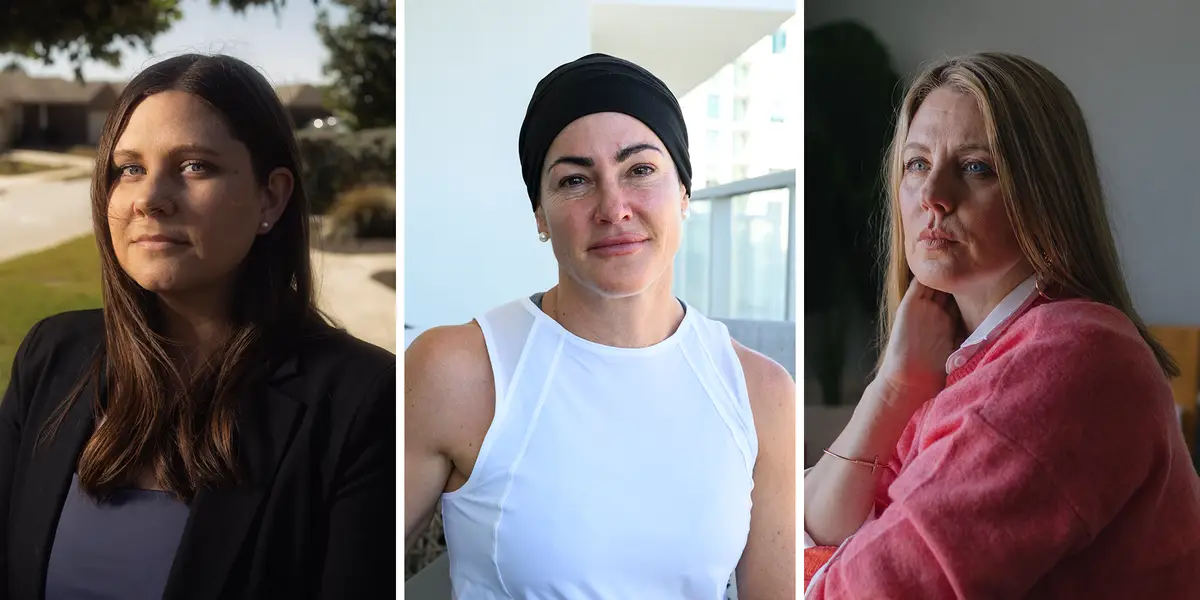Copyright Business Insider

Jennifer Goldsack had never felt so exhausted in her life. A former Olympic rower, she was trained to read every signal in her body ahead of high-performance events. Now the CEO of a digital healthcare nonprofit, she was traveling from Florida to Las Vegas for a major conference, HLTH. She'd be sharing the stage with industry titans while juggling 7 a.m. executive breakfasts, back-to-back meetings to secure new partnerships, and late-night mixers. She'd spent weeks preparing for it. As she got off the plane, the fatigue felt so extreme that she started to worry. She could barely string two sentences together. Was she crumbling under the pressure? On her way to the hotel, she cracked open a large Red Bull, and a thought hit her harder than the caffeine: This isn't normal. Something is wrong with me. Two months later, she would learn why. She had late-stage colon cancer at just 42 years old. "There was this sort of weird moment when I did get diagnosed, and it was — and this is going to sound bonkers for a late-stage colon cancer diagnosis — almost relief like, 'Oh, I was sick, I'm not broken,'" Goldsack said. Over the past 11 months, Goldsack has juggled cancer care while leading the Digital Medicine Society, a nonprofit that promotes the safe and equitable use of new technology in healthcare. She is part of a growing group of people in their 20s, 30s, and 40s developing aggressive cancers while in the prime of their lives. These millennials are C-suite executives, small business owners, middle managers, and early-career employees just stepping on the ladder. Some are new parents and budding homeowners, trying to balance their responsibilities while holding onto their job and health insurance — and, if possible, their ambition. Your job rules over your cancer care In the US, your job generally dictates your access to the best cancer care — deciding whether you'll get to see top doctors, qualify for benefits like short-term paid leave, or have a schedule that allows for doctors' appointments during the workday. Even community support, like access to meal trains, fundraisers, and childcare, often hinges on where and how you work. On December 31, 2020, when software developer Katie Coleman was diagnosed at 29 with an ultra-rare advanced-stage kidney cancer, she knew that she had to reserve all of her 2021 paid time off for treatment and recovery. She'd gotten married two months earlier and was building a house in Utah with her new husband when she got the diagnosis. Terrified of losing her job, she remembers Zooming into work meetings from the hospital waiting room as she waited for appointments with her oncologists. "I had my appointment, gave myself 30 minutes to an hour to break down after somebody telling me I was dying, and then went right back to working again to catch up," she said. She didn't want to appear off her game; her job was directly tied to her life-saving care. Even with "good" insurance, a cancer diagnosis drains finances almost overnight. Within weeks, you've hit your deductible, the out-of-pocket maximum — and you're still watching the bills pile up: extra gas, special toiletries, more childcare, hotel stays, the list goes on and on. Some patients we spoke to wondered what they would have done if they'd gotten cancer without private, employer-based coverage. Would they be dead? The fear is rational: One recent study of 1.5 million Americans in the National Cancer Database found that an uninsured patient diagnosed at stage 1 is more likely to die from cancer than a privately insured person diagnosed at stage 2. Government programs are not a panacea. Survival rates for Medicaid and Medicare patients under 65 are worse than those for privately insured patients. Related stories Business Insider tells the innovative stories you want to know Business Insider tells the innovative stories you want to know "My salary wasn't even close to what the medical bills were for treatment," Coleman said. "I actually was less worried about losing my job as I was worried about losing my insurance." Going part-time was not something Coleman considered because she had to work full-time to get her insurance benefits. In the US, any company with at least 50 employees is required to provide healthcare benefits, but only to workers who put in at least 30 hours a week. As many patients continue to work through their diagnosis, the financial strain piles up fast. A GoodRx analysis for Business Insider found that colon cancer patients under 45 lose about $5,000 in wages during their first year of treatment and miss nearly a month of work, compared with older patients who lose roughly $3,000 in wages and 18 work days. Coleman said that after her diagnosis, she stopped contributing to her 401(k) for more than two years. She and her husband eventually decided to move halfway across the country, ditching the brand new home they'd built together in Utah to be closer to her cancer center in Texas. "I didn't think I'd still be alive right now," she said. "Now, there's a possibility I could live a longer or more full life, so I have some catching up to do." Recently, Coleman started contributing to a retirement account again, but the amount isn't as much as she would have saved previously. She's paying off medical bills, prioritizing enjoying life, and is also contributing to cancer causes she believes in. Being your own boss doesn't make the financial puzzle any easier. Cancer patients who are self-employed or run small businesses said that, without paid time off, they were sometimes left with no choice other than to fight for their life and the viability of their business simultaneously. When cancer becomes your identity at work Many patients also described the challenge of deciding how, when, and if they should tell their employer they have cancer. The list of considerations can become overwhelming: Whom should they tell? Will it invite awkward conversations with colleagues? What will it mean for their job security? A 2024 survey of several hundred working cancer patients in the US suggested that about half feared disclosing a diagnosis at work, with many worrying it would change how coworkers treated them. Most informed a direct supervisor; fewer than half informed HR. And while many felt their colleagues were supportive, 43% wished their workplace were more considerate of their privacy. Rebecca Nellis, executive director of Cancer and Careers, a nonprofit that helps employers better support their employees through their diagnoses, said she's heard countless stories of patients returning to work, only to have awkward or inappropriate exchanges with colleagues, saying things like "Oh, my uncle had cancer too." "What are you supposed to do with that?" Nellis said. "Those are minefields." Tracy Robert, a 51-year-old clean-eating personal trainer and nutrition coach who was diagnosed with advanced-stage colon cancer at 40, typically hides her permanent colostomy bag under clothing using Spanx and spandex. Every time she decides to disclose her cancer status, she worries about being judged by her clients and colleagues. Colon cancer has so often been associated with poor diet and lifestyle choices, but emerging research shows that's not always the case. "I felt a lot of shame around it and a lot of 'What did I do wrong?'" she said. Goldsack, the nonprofit founder and CEO, felt a different kind of pressure. "Good leadership is to be able to be clear and to have a plan, or to at least have a plan to make a plan," she said. When she didn't know what tomorrow would bring in terms of her health, she had to redefine how she showed up for her colleagues and what strong leadership looked like. Radical transparency about her diagnosis was key, she said, as was blocking off big chunks of time on her calendar — sometimes entire days — for treatment and recovery. The CEO has pushed to keep working as much as she can through ongoing treatment this year, and wrestled with whether showing up when she was exhausted after chemotherapy really added much value. "I can't use work as a coping mechanism while failing to deliver," she said. There's also been a business cost to being open about her diagnosis with industry partners. "We've missed a lot of high-profile speaking opportunities," Goldsack said. "The proverbial phones stop ringing." Related stories Business Insider tells the innovative stories you want to know Business Insider tells the innovative stories you want to know Employers are scrambling to add benefits and save cash The situation is challenging, both for employees who shoulder full-time work while going through medical treatment, and for employers, who increasingly cite cancer care as the top cost driver for soaring healthcare spending. "There's the literal cost of the medical system, the loss of talent, and the loss of continuity from a productivity standpoint within a company," Nellis, of Cancer and Careers, said. Some employers are turning to add-on benefits, such as clinics and concierge patient navigator services, to help control their own costs and, ideally, save more lives in the process. Erica Hoffman, a 49-year-old distribution manager at Red Bull, who Business Insider featured earlier in this series, said her work-sponsored health benefits made a huge difference. She had Color Health, a virtual cancer clinic that provides screening, treatment, and after-care for cancer, plus Lantern, a cost-saving platform that sets users up with a dedicated nurse who helps schedule appointments. Those perks, coupled with effusive support from her colleagues, "really inspired me to work harder and progress more within the company because I am so grateful," Hoffman said. Those kinds of corporate resources are not the standard, but are spreading among employers, Nellis said. The nonprofit partnered with Publicis Groupe, the Paris-based ad firm behind the 2023 "Working with Cancer" initiative, which guarantees job security and screening leave for employees with cancer — policies now adopted by Google, Verizon, Walmart, and hundreds of others. And more Americans are surviving cancer, which means a growing cohort of workers will need access to long-term screenings and care. Going back to work Returning to a normal work routine after treatment can be complicated. "People are like, 'You're done, oh my gosh, congratulations. It's so great,'" Hoffman said. "Well, no, I still don't have hair. My fingernails are still falling off. I'm very emotional." Some patients told Business Insider they sweat more than they used to and need to be more vigilant about hydration. Others were frustrated by treatment-related weight gain. Some workers said that they struggled more with their mental health after treatment ended. Others found a new career direction, leaning into advocacy, pivoting to new jobs, or returning to school with a renewed sense of purpose. There is no concrete finish line for cancer, though. There will always be more scans and tests. As for Goldsack, she's eager to feel healthy and normal again. In October, she returned to the floor at the annual healthcare conference — meeting with other business leaders, hosting events, and working the expo floor. Anyone would have been forgiven for not realizing she had just gone through a year of cancer hell, unless they attended the panel she moderated: "Breaking the Cancer Care Ceiling." "Getting a diagnosis of cancer doesn't define you. It doesn't define you as a person who did something wrong," she told Business Insider. "While I am a cancer patient, I am not just a cancer patient. I am also a wife and a CEO and a friend and a boss and a mentor."



